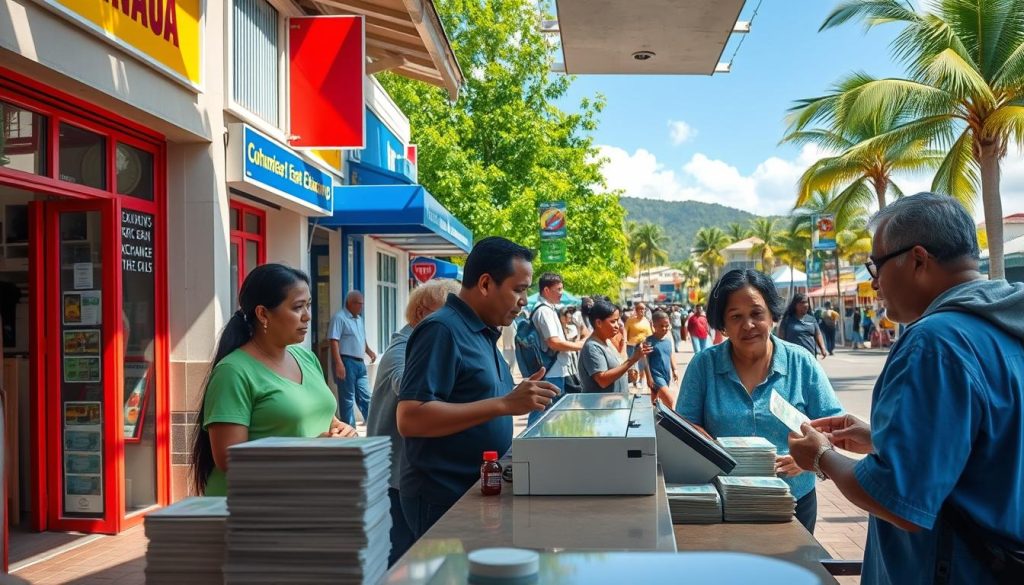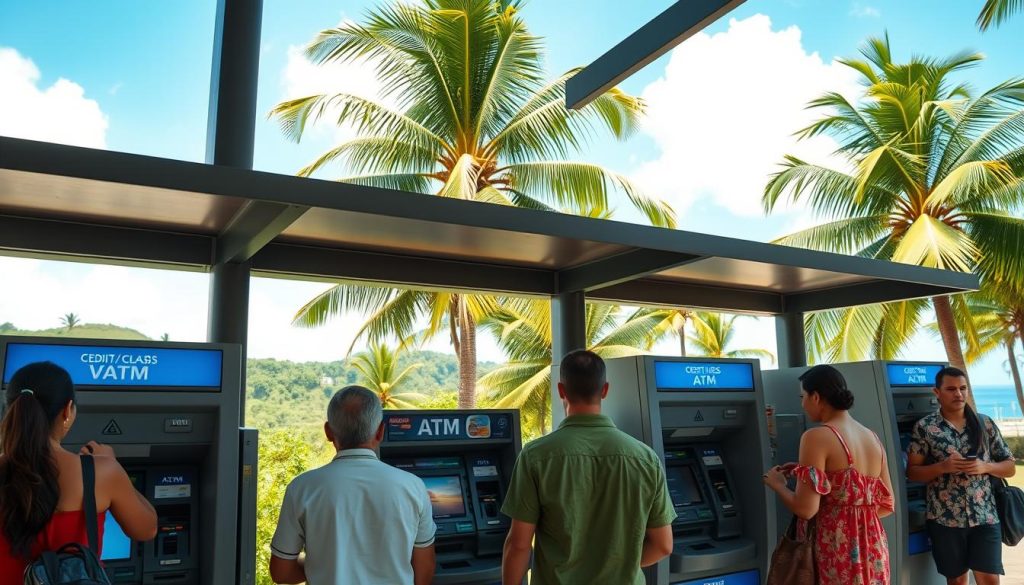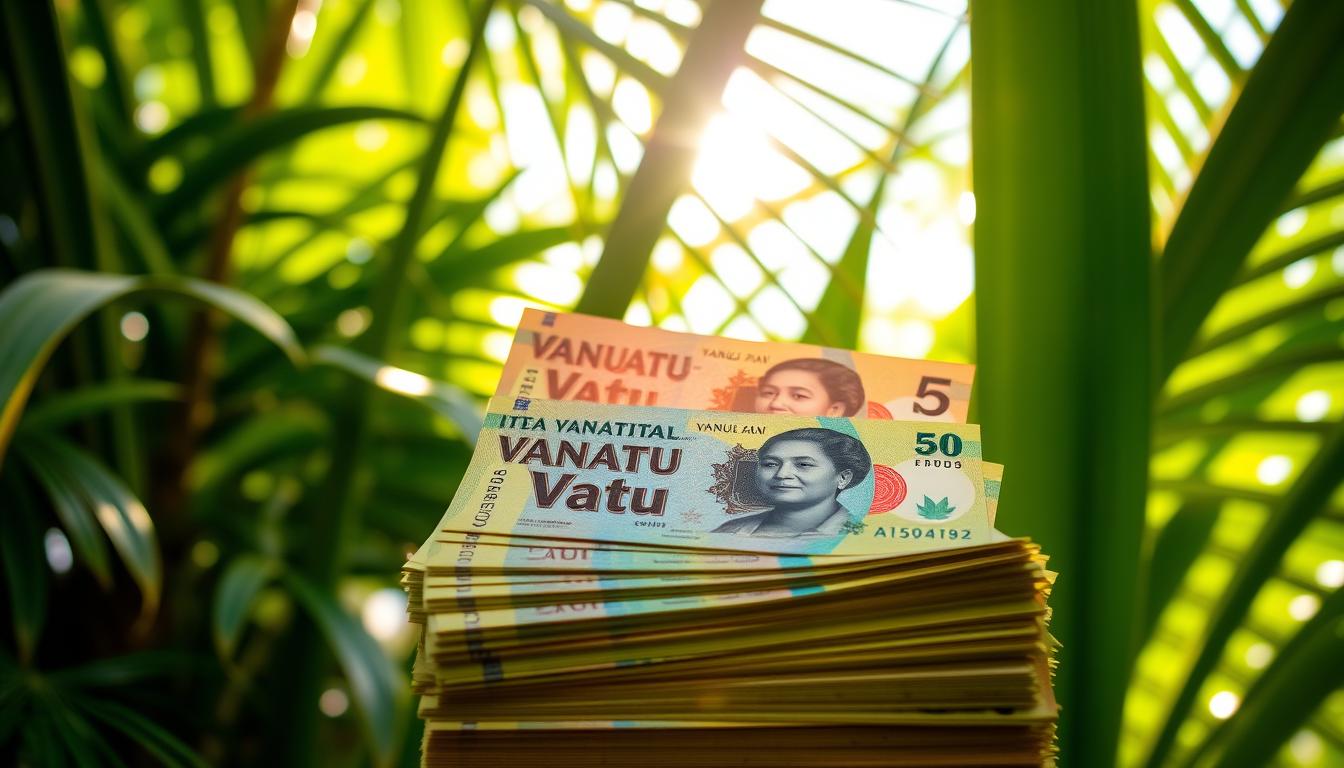Did you know that over 70% of travelers feel more confident when they understand the local currency before arriving at their destination? Managing your money abroad doesn’t have to be stressful—especially when you’re prepared.
When visiting a new country, knowing how to handle the local currency is key. In this guide, you’ll learn everything about the Vanuatu Vatu, the official currency, and how it plays a role in daily transactions. Whether you’re using cash or cards, we’ve got you covered.
From exchange rates to payment options, this guide simplifies your travel money planning. You’ll discover tips on using ATMs, travel cards, and even how to avoid unnecessary fees. With this knowledge, you’ll be ready to explore with confidence.
Introduction to Currencies and Payments in Vanuatu
Managing your money wisely before your trip can save you time and stress. When visiting a new destination, understanding the local currency and payment methods is crucial. In this section, we’ll explore the monetary landscape and why planning ahead matters.
Overview of Vanuatu’s Money Landscape
The official currency is the Ni-Vanuatu Vatu (VUV), used for most transactions. While some places accept Australian dollars, the exchange rate is often unfavorable. Cash is essential, especially in remote areas where card payments are less common.
VUV comes in both coins and banknotes, with denominations ranging from 5VT to 10,000VT. Knowing these details helps you handle daily expenses like meals, transportation, and activities with ease.
Why Planning Ahead Matters
Understanding the mid-market exchange rate ensures fair currency conversion. This rate is the benchmark for comparing rates offered by banks or exchange services. Planning ahead allows you to decide whether to exchange your travel money before departure or upon arrival.
Here are some tips to avoid unnecessary fees:
- Compare online rates with local options to find the best deal.
- Exchange a small amount of cash before your trip for immediate expenses.
- Use ATMs in major towns for better rates, but be aware of withdrawal limits.
Preparation not only saves money but also ensures you’re ready to explore without financial worries.
Understanding the Vanuatu Vatu
Currency knowledge is a key part of planning any international trip. The Ni-Vanuatu Vatu (VUV) is the official currency, introduced in 1981 after the country gained independence. It replaced the New Hebrides franc and has since become the backbone of daily transactions.
History and Denominations
The Vatu was introduced to establish a distinct national identity. It comes in both coins and banknotes, with denominations ranging from 5VT to 10,000VT. Over time, low-value coins like 1VT and 2VT were phased out due to inflation.
Here’s a quick overview of the current denominations:
| Type | Denominations |
|---|---|
| Coins | 5VT, 10VT, 20VT, 50VT, 100VT |
| Banknotes | 200VT, 500VT, 1,000VT, 2,000VT, 5,000VT, 10,000VT |
Role in Daily Transactions
The Vatu is non-subdivisible, meaning it doesn’t have smaller units like cents. This can be both a challenge and a benefit. For small purchases, such as snacks or souvenirs, cash is essential. Many local vendors and markets prefer cash over cards.
In remote areas, atm withdrawal options are limited, making cash even more important. Tipping is also common, and having small denominations on hand is helpful. While some tourist areas accept Australian dollars, the exchange rate is often unfavorable.
Using ATMs in major towns can provide better rates for withdrawal, but it’s wise to carry enough cash for daily needs. This ensures you’re prepared for any situation, whether you’re exploring bustling markets or relaxing on a secluded beach.
Navigating Currency Exchange Rates
Understanding currency exchange rates can make or break your travel budget. When you exchange money, even small differences in rates can add up. Knowing how to navigate these rates ensures you get the best deal.
What is the Mid-Market Rate?
The mid-market rate is the benchmark rate banks use to trade currencies. It’s the fairest rate you can get. However, most exchange providers add a markup to this rate, increasing your costs.
Tracking the mid-market rate helps you compare offers. Online tools and apps can show live rates. This way, you’ll know if you’re getting a fair deal.
Markup and Additional Fees Explained
Banks and exchange providers often add markups to the mid-market rate. These markups can range from 1% to 5%. Additionally, some providers charge flat fees or a percentage of the amount exchanged.
Here’s how to avoid unnecessary fees:
- Compare rates online before exchanging money.
- Use ATMs in major towns for better rates.
- Check if your card provider charges foreign transaction fees.
Not all card transactions reflect the mid-market rate. Some providers add hidden fees. Always read the fine print to avoid surprises.
| Exchange Method | Pros | Cons |
|---|---|---|
| Online Platforms | Competitive rates, convenient | May have delivery fees |
| Local Money Changers | Immediate cash, no delivery wait | Rates may include higher markups |
| ATMs | Mid-market rates, widely available | Withdrawal fees may apply |
Monitoring rates and understanding fees can save you money. Whether you’re exchanging cash or using a card, being informed ensures you get the most out of your travel budget.
Tips for Exchanging Money in Vanuatu
Smart money management starts with knowing where and how to exchange your funds. Making the right choices can save you money and ensure a hassle-free experience. Here’s how to navigate currency exchange like a pro.

Avoiding Airport Exchange Pitfalls
Airport exchange counters are convenient but often come with poor rates and high fees. Providers here add significant markups, leaving you with less cash for your trip. Instead, exchange a small amount for immediate needs and wait for better options.
For better deals, avoid exchanging large sums at airports. Use ATMs or local providers in city centers for more favorable rates. This simple step can save you a surprising amount of money.
Choosing Local Providers for Better Rates
Local currency exchange offices in city centers often offer better rates than airports. Look for trusted providers with transparent fees. For example, some offices in Port Vila are known for competitive rates and reliable service.
Always compare rates before exchanging money. Online tools can help you track the mid-market rate, ensuring you get a fair deal. This way, you’ll know if a provider is adding unnecessary markups.
Using a travel card or debit card can also be a cost-effective alternative. These cards often provide mid-market rates and lower fees compared to cash exchanges. They’re especially useful for larger transactions or when you’re on the go.
| Exchange Method | Pros | Cons |
|---|---|---|
| Airport Counters | Convenient, immediate cash | High fees, poor rates |
| Local Providers | Better rates, transparent fees | May require research |
| Travel Cards | Mid-market rates, low fees | May have activation costs |
Pre-exchanging money before departure can also be a smart move. This gives you time to compare rates and avoid last-minute stress. However, if you prefer to wait, ensure you have a plan for accessing cash upon arrival.
When selecting a provider, always choose reputable ones to minimize risk. Look for reviews or ask locals for recommendations. A little research goes a long way in ensuring a smooth exchange process.
Payment Options: Cash, Debit, and Credit Cards
Exploring a new destination is exciting, but managing your payment options can make or break your experience. Whether you’re shopping at local markets or dining at a restaurant, knowing the best way to pay ensures a smooth trip. Let’s dive into the pros and cons of cash, debit, and credit cards.
Benefits of Using a Travel Debit Card
Travel debit cards are a popular choice for many reasons. They offer low transaction fees and provide access to mid-market exchange rates. This means you get more value for your money compared to exchanging cash. Plus, they’re widely accepted in most places, making them convenient for larger purchases.
Another advantage is security. If your card is lost or stolen, you can quickly block it to prevent unauthorized use. Many cards also offer fraud protection, giving you peace of mind while traveling. Just be sure to check for any atm fee or foreign transaction charges before using it abroad.
When to Rely on Cash Payments
While cards are convenient, cash is still king in many situations. Small businesses, local markets, and rural areas often prefer cash transactions. It’s also essential for tipping, small purchases, or places that don’t accept cards. Carrying cash ensures you’re prepared for any scenario.
However, it’s wise to avoid carrying large amounts of cash to minimize the risk of loss or theft. Instead, withdraw smaller sums as needed from ATMs in major towns. This way, you can balance convenience with safety.
Here’s a quick comparison of payment methods:
- Cash: Ideal for small purchases and tipping but carries a higher risk of loss.
- Debit Cards: Low fee options with mid-market rates, perfect for larger transactions.
- Credit Cards: Great for emergencies or rewards but may come with higher fees.
By combining cash and cards, you can enjoy the flexibility and security of both options. This balanced approach ensures you’re ready for any situation, whether you’re exploring bustling markets or relaxing on a secluded beach.
Using ATMs in Vanuatu
Accessing cash while traveling can be straightforward if you know where to look. ATMs are widely available in major cities like Port Vila and Luganville, making it easy to withdraw local currency. However, in rural areas, options are limited, so planning ahead is essential.

Finding Reliable ATM Locations
In urban centers, ATMs are typically found near banks, shopping areas, and hotels. These locations offer reliable services and often charge lower fees. For example, ATMs in Port Vila are convenient and provide competitive exchange rates.
In contrast, rural areas may have fewer ATMs, and some might not accept international cards. Always carry enough cash when venturing outside major cities to avoid inconvenience.
Here are some tips for using ATMs effectively:
- Choose ATMs affiliated with major banks for better security and lower fees.
- Withdraw larger amounts to minimize transaction fees, but avoid carrying too much cash.
- Notify your bank about your travel plans to prevent card freezes.
Having a backup payment method, such as a credit card or debit card, is also wise. This ensures you’re prepared if ATM access becomes limited or your primary card is declined.
By following these tips, you can manage your cash needs efficiently and focus on enjoying your trip.
Managing Fees and Transaction Costs
Traveling abroad often comes with hidden costs that can add up quickly. From conversion fees to transaction charges, these expenses can impact your budget if you’re not prepared. Understanding these costs and planning ahead can save you money and stress.
Here are the most common fees you might encounter:
- Currency conversion fees: Charged when exchanging money or using cards abroad.
- ATM withdrawal fees: Applied when using ATMs outside your bank’s network.
- Foreign transaction fees: Added to card purchases in a different currency.
These fees can add up, especially if you’re making frequent transactions. For example, a 3% foreign transaction fee on every purchase can significantly reduce your spending power. That’s why it’s essential to compare rates and choose the most cost-effective options.
- Use cards with low or no foreign transaction fees.
- Withdraw larger amounts from ATMs to reduce per-transaction fees.
- Compare conversion rates before exchanging money.
Budgeting is another key strategy. Plan your daily expenses and set aside a buffer for unexpected costs. This helps you avoid overspending and keeps fees manageable. Monitoring your expenses continuously ensures you stay on track.
By being proactive, you can reduce unnecessary fees and make the most of your travel budget. Whether you’re exchanging cash or using cards, a little planning goes a long way in keeping costs under control.
Vanuatu: Ultimate Travelers Guide to Currencies & Payments
Being prepared with the right financial tools ensures a stress-free journey. This guide has covered everything you need to know about managing your money effectively while exploring this beautiful destination. Let’s recap the key points to help you travel smart.
First, understanding the local currency is essential. The Ni-Vanuatu Vatu (VUV) is the official currency, and cash is widely used, especially in rural areas. For convenience, consider using a travel debit card to access mid-market rates and minimize fees. Always compare exchange rates to get the best deal.

- Use a trusted provider for currency exchange to avoid high markups.
- Set up a secure account for managing your travel funds, ensuring easy access and fraud protection.
- Monitor your spending to stay within budget and avoid unnecessary fees.
When it comes to payment options, a mix of cash and cards works best. Cash is ideal for small purchases and tipping, while cards offer convenience and security for larger transactions. Avoid dynamic currency conversion (DCC) to save on additional costs.
By following these tips, you’ll be well-prepared to handle your finances with confidence. Whether you’re exploring bustling markets or relaxing on a secluded beach, this guide has everything you need to make the most of your trip. Travel smart, and enjoy every moment!
Comparing Currency Exchange Methods: Pre-Trip vs. On Arrival
Deciding when and where to exchange currency is a crucial part of travel planning. The method you choose can affect your overall cost and convenience. Whether you exchange money before your trip or upon arrival, each way has its pros and cons.
Pros and Cons of Pre-Exchanging Money
Exchanging money before your trip can save you time and stress. You’ll have local currency ready for immediate expenses like transportation or meals. Many banks offer competitive rates for larger sums, which can lower your overall cost.
However, pre-exchanging money may not always be the best method. Rates can vary, and you might end up with leftover cash if you overestimate your needs. Additionally, some providers charge fees for currency conversion, which can add up.
Advantages of Local Currency Exchange
Exchanging money upon arrival can be convenient, especially if you’re unsure how much cash you’ll need. Local providers in city centers often offer better rates than airport counters. For example, ATMs in major towns provide mid-market rates, saving you money on markups.
However, relying on local exchanges has its risks. In remote areas, ATMs may be scarce, and providers might charge higher fees. It’s also important to notify your bank about your travel plans to avoid card freezes.
| Exchange Method | Pros | Cons |
|---|---|---|
| Pre-Trip Exchange | Competitive rates, immediate cash | Potential leftover cash, conversion fees |
| Local Exchange | Better rates, flexibility | Limited availability, higher fees in remote areas |
Choosing the right way to exchange money depends on your travel style and budget. Pre-exchanging money ensures you’re prepared, while local exchanges offer flexibility. By comparing rates and understanding the pros and cons, you can make the best decision for your trip.
Budgeting and Financial Planning for Your Trip
Planning your travel budget in advance can make your trip smoother and more enjoyable. By estimating your daily expenses and minimizing extra charges, you can focus on exploring without financial stress. Here’s how to create a budget that works for you.

Estimating Daily Expenses in VUV
Start by calculating your daily costs in VUV. For budget travel, expect to spend around 24,780 VUV per day. This includes accommodation, meals, and transportation. Mid-range travellers might spend 57,282 VUV daily, while luxury travellers could spend up to 113,816 VUV.
Break down your expenses into categories. For example, a budget restaurant meal costs about 1,182 VUV, while a mid-range restaurant might charge 2,740 VUV. Transportation costs vary, but planning ahead helps you stay within budget.
Strategies to Minimize Extra Charges
Unexpected fees can add up quickly. To avoid them, use ATMs affiliated with major banks for lower withdrawal fees. Notify your bank about your travel plans to prevent card freezes. This ensures you can access your funds when needed.
Carry a mix of cash and cards for flexibility. Cash is ideal for small purchases and tipping, while cards are convenient for larger transactions. Avoid dynamic currency conversion (DCC) to save on additional costs.
Here are some tips to keep your budget on track:
- Compare exchange rates before converting money.
- Use a travel card for mid-market rates and low fees.
- Plan for incidental costs like souvenirs or extra activities.
By preparing a flexible budget, you can enjoy your trip without worrying about overspending. Whether you’re dining at a local restaurant or relaxing at your home away from home, these tips will help you manage your finances with ease.
Safety Tips for Managing Your Money Abroad
Staying safe with your finances while traveling is just as important as planning your itinerary. Protecting your money vanuatu ensures you can focus on enjoying your trip without unnecessary stress. Here’s how to keep your cash and cards secure while exploring.
Protecting Your Cards and Cash
Carrying multiple payment methods is a smart way to stay prepared. Use a mix of cash and card vanuatu options to avoid relying on just one source. For added security, consider using RFID-blocking wallets or money belts to protect against electronic theft.
Always keep backup funds in a secure location, like a hotel safe. This ensures you have access to money vanuatu if your primary wallet is lost or stolen. Additionally, notify your bank about your travel plans to prevent card freezes due to suspicious activity.
Here are some practical tips to safeguard your finances:
- Use secure ATMs located in well-lit, busy areas.
- Avoid sharing personal information with vendors or strangers.
- Keep emergency contact numbers for your bank and card providers handy.
By following these steps, you can minimize risks and enjoy your trip with peace of mind. Whether you’re using a card vanuatu or carrying cash, staying vigilant ensures your finances remain safe throughout your journey.
Conclusion
Effective financial planning can transform your travel experience. By understanding the local currency and payment options, you can navigate your trip with confidence. Monitoring exchange rates and minimizing fees ensures you get the most out of your budget.
Plan ahead whether you’re exchanging money before departure or using local services upon arrival. Avoid high fees at the airport by choosing trusted providers or ATMs in city centers. Balancing cash and card usage offers both security and flexibility for your spending needs.
Remember, a little preparation goes a long way. Keep this guide handy to make informed decisions and enjoy a smoother, cost-effective journey. Safe travels!
The above is subject to change.
Check back often to TRAVEL.COM for the latest travel tips and deals.






0 Comments